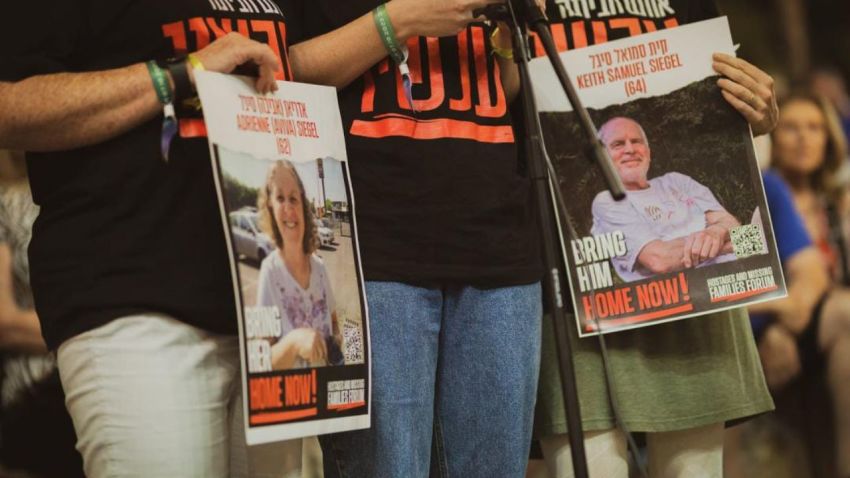Freed hostage Aviva Siegel shares horrors of Hamas captivity, says she 'touched death'

Touching death
Siegel also spent time underground during her captivity.
At one point, Hamas forced Siegel, her husband and another female hostage into a tunnel so dark and deep underground that Siegel felt as if she had just "touched death."
Due to the lack of ventilation in the tunnel, the middle-aged couple could barely breathe, and Siegel tried to comfort her husband as he gasped for air. She instructed him to lie down while she did the same, praying that Keith would not die before her.
"I remember not only thinking that I might die or Keith might die, but I was scared to look at him, just scared to look at his chest going up and down and then maybe see death," the former hostage recalled.
Their captors eventually let the hostages out of the tunnel and moved them to a new location. Siegel said after she emerged from the tunnel and experienced fresh air for the first time in a while, it felt as if she had been "born again."
The relief was short-lived, however, as the couple was moved to a house in Gaza with terrorists Siegel described as "the worst monsters on earth." While their captors kept them alive, the terrorists starved them, often pretending not to understand the hostages' pleas for food.
"They used to sit and eat in front of us and starve us," Siegel said about the terrorists guarding them.
After one of the girls held in captivity with the Siegels asked for food, the guards finally brought some, but it was only three small pieces of pita bread. Siegel saved most of the bread, not caring if it became moldy, as she wanted to have food for her husband in case their captors forced them to go days without food again.
Treating young girls like 'dolls'
The terrorists also sexually abused the young girls in captivity by treating them like "dolls" and forcing them to wear tight-fitting clothes, she said. Guards would also accompany female hostages if they went to shower, forcing the girls to keep the door open so they could watch.
Once, Siegel grew worried when a girl she saw head to the bathroom didn't return for several minutes. When the girl finally returned, the mother and grandmother could tell from the young woman's face that something had happened.
Seeing that the girl was shaking, Siegel wrapped her in a hug, which resulted in one of the terrorists screaming at the older woman, as the hostages were not allowed to embrace one another.
"I felt like he was going to kill me, all because I was hugging this girl that he had touched," Siegel recalled. "And she had to pretend that everything was OK after that happened and smile at him because she was scared."
Another girl suffered a beating after she was ordered to dress in a hijab and accompany a guard. The girl turned to the other hostages and said that she was scared, and then the guard took her by the hair and threw her to the floor. The man took his gun out and told the girl, "One more word, and I'm going to kill you."
"And I felt that in my bones," Siegel said. "I wanted to scream, 'What are you doing to this girl?'"
Several terrorists came into the room, and after wrapping the girl in a blanket, the group of men beat her with sticks. After the beating ended, the girl sat on the floor weeping, and Siegel noticed that her body was all red.
"I couldn't get up and give her a hug; the only thing I could do was just look into her eyes and tell her that I love her," Siegel remembered. "After a while, I asked her why she didn't scream because I wanted to scream for her, and she said that she did not want to give them the pleasure because they would have beaten her even more."
After enduring over 50 days as a hostage, Siegel was freed during a temporary ceasefire last November. The former captive now campaigns on behalf of her husband and the remaining hostages, sharing her testimony to urge politicians to secure a deal for their release.
According to Elan Siegel, the family was overjoyed when they learned her mother was coming home last November. However, the knowledge that her father would remain captive in Gaza prevented them from feeling "pure happiness."
The Siegels' daughter argued that it's not the Israeli government's sole responsibility to secure the freedom of the remaining hostages. She stated that the United States, Qatar, Egypt and governments all over the world have a duty, and no effort will ever be enough until Hamas no longer holds innocents captive.
"It's not about Judaism, and it's not about Israelis," Elan said. "In the tunnels right now are Muslims and Hindus and Thai people that have nothing to do with the Israeli-Palestinian conflict."
Samantha Kamman is a reporter for The Christian Post. She can be reached at: samantha.kamman@christianpost.com. Follow her on Twitter: @Samantha_Kamman



























